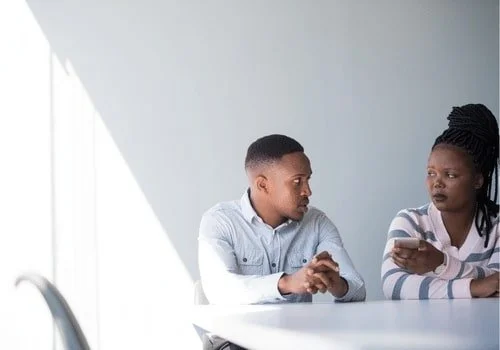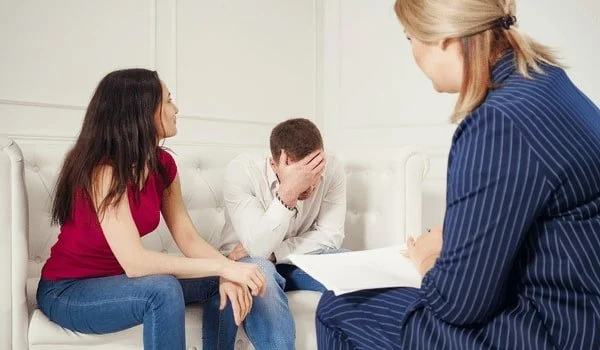A Complete Guide for When to Go to Couples Therapy
There's no easy answer to the question of when to seek couples therapy. Every relationship is different, and couples counseling isn't a magic solution. However, it can be extremely helpful for couples who are invested in the process. In this post, we'll share the top signs that can cue you into when to go to couples counseling, what to expect from couples therapy, and how it can help you and your partner.
What is couples counseling?
Couples therapy is a form of therapy specifically designed for people in partnership, as well as for folks who practice consensual non-monogamy. In this type of counseling, partners work toward common goals that they set together with their counselor.
These goals vary depending on the unique wants and needs of the couple. The therapist helps the couple in working toward those goals, while offering professional support, feedback, and direction.
Though people can seek therapy at any time for any reason, most couples start counseling when they experience some kind of change or issue. Many couples hope to work through the transition or problem together, though some consider seeking couples therapy to help them navigate a separation or divorce.
When should you go to couples therapy?
People seek couples counseling for all kinds of different reasons. There is no "right" or "wrong" answer to the question of when to go to couples counseling. However, if you and your partner are experiencing any of the following telltale signs, you might benefit from working with a counselor.
You're experiencing a major life change
Transitions can be both exciting and stressful at the same time. Whether you and your partner are moving in together, getting married, having kids, moving cities, getting a new job, or experiencing an empty nest, couples therapy can help you navigate the transition with more ease.
You constantly have the same fight about household chores or other topics
If you're having the same argument over and over again, it could be a good time to start couples therapy. A couples therapist can help you reflect on where you're feeling stuck and how to resolve conflict in a more constructive way.
You feel generally unhappy in your relationship
Do you have a general sense of dissatisfaction in your relationship but can't quite put your finger on it? Couples therapy can help you explore those feelings to figure out exactly what's going on--and how to help you feel better.
You have poor communication
Do you and your partner avoid having the tough conversations you really need to have? Does it feel like your partner just isn't listening to you? Couples therapy can help you learn healthy communication skills that will help you both talk and listen.
You're having problems with physical intimacy
It's common to experience challenges with sex over the course of a relationship. It's challenging when each partner has different needs, or when mental or physical health problems get in the way of connecting. Therapy can help you learn how to work with these issues together.
There's been an affair or other breach of trust
Infidelity can be both a cause and effect of relationship issues. Couples therapists help partners learn how to restore trust, whether there's been an affair or some other boundary has been crossed.
You're considering separation or divorce
While many couples seek therapy to heal their relationship, not all couples do. Some couples choose to work with a licensed counselor to have a safe place to process the end of their relationship and agree on an action plan for moving forward.
You feel alone or disconnected
It can be hard to figure out how to reconnect when one partner feels disconnected from the other. Marriage counseling provides couples with a safe space to communicate their emotions and learn new ways to foster emotional intimacy.
You just want a better relationship
You don't have to be in crisis to consider seeking professional support. Some couples work with a therapist because they just want a tune up in their relationship, want a neutral party to add new perspective, want to learn new skills, or need a place to safely talk about feelings.
What can we expect from couples therapy?
Again, everyone's experience with therapy is different. Couples have different needs, and every therapist has their own unique approach. With that being said, here are a few common things you can expect from your couples therapy sessions.
Share information about your past and present
Your couples therapist will typically spend the first few sessions of couples therapy getting to know both of you as individuals and as a couple. They may ask questions about your upbringing, past relationships, and current relationship problems in order to gain some context.
Set mutual goals together
As your couples therapist is getting to know you, you'll also begin to formulate goals. This will provide a jumping off point for your mutual work in therapy and give some direction to the counseling process. Of course, you can revisit your goals at any time and adjust them as needed.
Learn about how to have a healthy relationship
Sometimes, we may not even realize we're stuck in old, unhealthy habits--especially if we didn't have positive relationship role models growing up. Therapy can help you learn what a healthy relationship entails and how to make positive shifts toward that ideal.
Have a safe space to process emotions
Many people struggle to talk about feelings. Working with a licensed marriage counselor gives you and your partner the opportunity to get more comfortable expressing yourselves and make sense of all the complicated feelings that can arise in a relationship.
Talk about the deeper issues in your relationship
In that same vein, you can expect to dive beneath the surface in couples therapy. We won't dance around the issues--if that worked, you wouldn't need help from a couples counselor. Instead, we'll get to the root of the issues that are keeping you stuck.
Practice new skills outside of session
You'll get the best results out of couples therapy if you and your partner commit to practice what you learn. You spend a relatively small amount of time with your therapist, so it's important to see how your new skills work in real-life scenarios.
How can couples counseling help?
Working with a couples counselor can improve you and your partner's wellbeing, teach you new relationship skills, help your sex life, and more!
Get on the same page
It can be tough to work together if you and your partner are operating with different assumptions. Studies show that couples counseling can help partners reach a mutual understanding of the expectations within the relationship.
Improve emotional and physical intimacy
Emotional and physical intimacy are often linked, and many couples struggle in these areas from time to time. Research suggests that couples who attend therapy often notice an improvement in both types of intimacy.
Practice conflict resolution
Having disagreements with your partner from time to time is inevitable. However, constant fighting is frustrating and exhausting. Therapy can help reduce conflict, likely because partners gain a better understanding of each other and learn new ways to resolve issues.
Break out of negative patterns
We often imitate the patterns we saw modeled in relationships when we were growing up. This can be helpful or unhelpful, depending on your role models. Marriage therapists teach couples new ways to interact and communicate, helping them break out of the status quo that keeps them stuck.
Combat mental health issues
Studies show that marital problems are associated with mental health issues like depression and anxiety. Relationship counseling has been shown to reduce ongoing relationship distress, thus helping individual mental health problems as well.
When couples therapy might not work
Though marriage counseling can be effective for lots of couples, there are certain times when you may not get the most out of therapy. If you and your partner are in any of these situations, you may want to reconsider whether therapy is worth it.
You think couples counseling will magically fix everything
Unfortunately, simply showing up to therapy doesn't work. Therapists don't have magic solutions to human problems. Seeking professional help can be most effective when both partners are equally willing to put in the work needed to improve the relationship.
You're unwilling to put in work between sessions
Again, simply showing up won't solve your problems. You and your partner can get the best results out of therapy by practicing your new skills outside of session. If you don't apply what you learn to real-life scenarios, it's unrealistic to expect real change.
You only want to talk--not listen
Communication is a major struggle for lots of couples. However, many communication problems can be eased with more listening and less talking. If you're unwilling to hear your partner out, you might not gain much from couples therapy.
You want to change your partner
It's okay to want to change things about your relationship--that's what therapy is for, after all. However, that's a totally different thing than wanting to change your partner. At the end of the day, you only have control over your own behavior. Focusing your energy on what you can change about your own approach will likely yield better results.
You're in an abusive relationship or experiencing crisis
While therapy can help if both partners are willing to address their unhealthy patterns, it's not the solution if you're in immediate danger. Contact the National Domestic Violence Hotline for immediate support if that's the case. You can also access them by calling 1-800-799-SAFE (7233) or by texting "START" to 88788.
Speaking directly with a couples therapist can help you figure out when to go to couples counseling
If you're still unsure about when to seek couples therapy, consider asking a couples counselor directly. Our team of therapists offer complimentary consultations to help you get a sense of whether our services are a good fit for your needs.
We take a client-focused approach to couples therapy, meaning we customize treatment to your unique values, needs, and goals. We recognize you as the experts in yourselves--we're just here to help guide you and support you along the way.
Beyond working with couples, we're also happy to support polycules or folks in other non-traditional relationships.
Sound like we might be a good fit for each other? Let's start the process. We encourage you to reach out today to schedule a free consultation.









